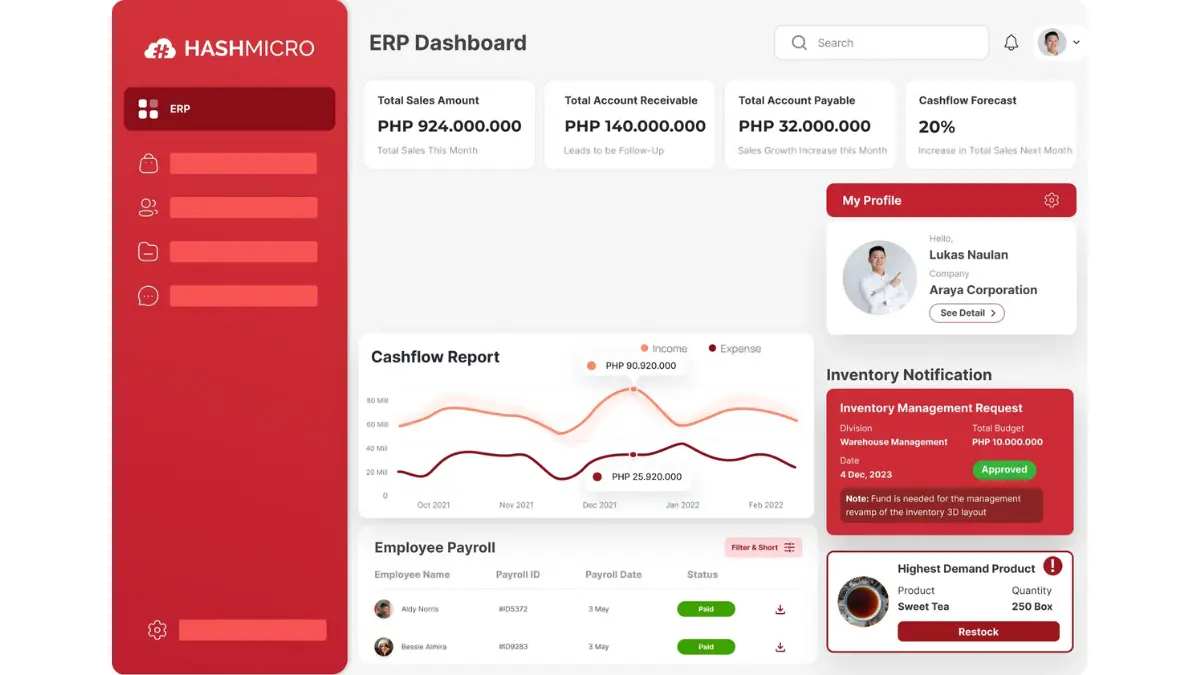Good corporate governance is the backbone of any successful organization, yet many businesses struggle to implement it effectively. From ensuring compliance to managing transparency, it’s a critical challenge for leaders striving for growth and stability.
One common issue is the lack of a structured framework that ensures accountability, often leading to inefficiencies and conflicts of interest. This makes it difficult for organizations to operate cohesively and sustain stakeholder trust.
According to the Institute of Corporate Directors in the Philippines, while corporate governance has seen improvements, challenges such as insufficient board independence persist.
To address these challenges, it’s essential to embrace technology solutions like HashMicro ERP that streamline processes and enhance decision-making. Join us to discover how these tools can improve corporate governance and drive success.
Table of Contents

Key Takeaways
|
What is Good Corporate Governance?
Good corporate governance ensures a company is directed and controlled in a transparent, accountable, and ethical manner, benefiting all stakeholders. It involves establishing clear roles, responsibilities, and decision-making processes, as well as effective risk management and compliance.
Corporate governance not only fosters effective management but also strengthens market confidence and access to external capital. By adhering to principles such as the rule of law and equity, it ensures the organization remains sustainable and responsive to societal needs.
Ultimately, good corporate governance is about continuous improvement, aligning business practices with evolving standards and expectations. This approach allows companies to leave a lasting, positive impact on their stakeholders and society.
Why is Good Corporate Governance Crucial?
Effective corporate governance is crucial for fostering an environment where all stakeholders can actively participate in decision-making. By embedding diversity and inclusion at the leadership level, governance fosters a range of perspectives that ensure decisions meet the needs of all parties involved, reflecting the principles of good governance.
A strong governance framework is essential for maintaining transparency, accountability, and fairness across the organisation. This framework serves as a guide for upholding corporate good governance, ensuring that all practices align with ethical standards and are continually evaluated for effectiveness.
For shareholders, good corporate governance has a direct impact on their trust and confidence in the board’s decisions. Transparent and accountable board practices, such as regular evaluations and the separation of powers, safeguard shareholders’ interests by mitigating conflicts of interest and promoting sound, ethical decision-making.
Advantages of Good Corporate Governance
Good corporate governance plays a pivotal role in shaping the success and sustainability of an organization. It ensures that companies operate with integrity, build trust with stakeholders, and navigate challenges efficiently.
The following are the main benefits of good corporate governance:
- Enhancing transparency: Effective corporate governance fosters trust with stakeholders by ensuring clear and open communication about the company’s operations, financial performance, and strategic decisions. This transparency reduces the risk of mismanagement and fosters stronger relationships with both investors and customers.
- Increasing accountability: A well-defined governance structure assigns specific responsibilities to individuals, making it easier to hold them accountable for their actions. This level of accountability encourages responsible and ethical behaviour at all organisational levels, ensuring alignment with corporate values.
- Improving risk management: Companies practising good corporate governance are equipped with robust mechanisms to identify, assess, and manage risks proactively. By minimizing potential breaches and damages, they protect both the organisation and its stakeholders from unforeseen challenges.
- Attracting investors: Investors are drawn to companies with strong governance practices that demonstrate transparency and stability. A commitment to corporate governance ensures that investors are in responsible hands and on a path toward sustainable growth.
- Complying with regulations: Good corporate governance is founded on adhering to legal and regulatory requirements, ensuring that companies comply with industry standards. By maintaining regulatory compliance, organizations mitigate the risk of penalties and legal disputes, safeguarding their reputation and operations.
- Growing sustainably: Effective governance aligns short-term performance with long-term objectives, striking a balance between immediate gains and sustainable growth. This approach supports corporate strategy, boosts shareholder value, and enhances the company’s long-term outlook.
Fundamental Principles of Corporate Governance
The principles of corporate governance form the bedrock of a company’s structure, guiding it toward ethical decision-making and sustainability. They ensure that a company operates with integrity and that the rights and interests of its stakeholders are protected.
Below, we examine the five core principles that define good corporate governance and their importance in promoting responsible leadership:
1. Accountability
Accountability is one of the core principles of corporate governance, ensuring that decision-makers are responsible for their actions and decisions. The board of directors, as the primary governing body of the company, must be accountable to shareholders, stakeholders, employees, and the general public.
This principle requires the board to act with transparency and diligence, ensuring that their decisions are justifiable and align with the company’s best interests. By embedding accountability, an organisation minimises the risk of unethical actions and strengthens trust with stakeholders.
2. Transparency
Transparency is a critical principle in good corporate governance as it guarantees that all company operations, decisions, and financial records are open to scrutiny. Shareholders and stakeholders should have access to accurate and timely information, presented in clear and understandable ways.
This openness helps ensure that decisions are made based on factual data, and stakeholders can easily interpret the company’s performance and challenges. Transparency not only promotes trust but also supports accountability, creating an environment where businesses operate ethically and responsibly.
3. Fairness
Fairness in corporate governance demands that all stakeholders be treated equality and with respect. A diverse and inclusive board is essential, as it brings a range of varied perspectives and experiences that enhance decision-making processes.
All members of the board and the organisation need to participate actively, ensuring that no voice is overlooked. By fostering fairness, companies create a more balanced and effective governance structure, driving better decision-making and stronger organisational outcomes.
4. Responsibility
The principle of responsibility emphasises the need for the board of directors to oversee the company’s operations diligently, ensuring that everything, from strategy to legal compliance, is in line with best practices. Board members must act in good faith, ensuring they fulfill their fiduciary duties by prioritizing the company’s and stakeholders’ long-term interests.
This involves proactive oversight of financial reports, risk management, and adherence to ethical business practices, thereby maintaining the company’s integrity and commitment to good corporate governance. Responsibility ensures that the board’s decisions are made with due diligence and care, safeguarding the company’s future.
5. Communication
Communication is vital to effective corporate governance, as it ensures that board members and stakeholders can engage in open discussions and decision-making processes. Robust debates and discussions in the boardroom facilitate the exchange of diverse perspectives, leading to more informed decisions.
By promoting clear and continuous communication, companies can foster consensus-building, where decisions reflect the collective interests of all involved. Good governance is about ensuring that every voice is heard and that decisions made are in the best interests of the organisation and its stakeholders.
Additional Essential Principles of Corporate Governance
In addition to the core principles, several other essential characteristics of corporate governance help strengthen the foundation of ethical and responsible management. These principles ensure that the company adapts to changing environments while maintaining transparency, accountability, and the trust of its stakeholders.
Below, we explore these additional principles that underpin good corporate governance.
6. Responsiveness
Good corporate governance requires organizations to respond swiftly and effectively to crises or unexpected events. A company that prioritizes responsiveness ensures that it communicates promptly and honestly with shareholders and stakeholders, maintaining trust even in challenging times.
7. Effectiveness and efficiency
Boards of directors must execute their duties with both effectiveness and efficiency to ensure the organization runs smoothly. This principle encourages organizations to adopt innovative solutions, such as digital transformation, to streamline operations, reduce environmental impact, and improve overall performance.
8. Equity and inclusivity
Corporate governance thrives on fairness and inclusion, where every board member’s voice is heard and valued. This principle extends beyond the boardroom, fostering a company-wide culture that values diversity, equity, and inclusion (DEI), thereby creating an environment where diverse perspectives lead to more informed decision-making.
9. Rule of law
Adhering to the rule of law ensures that corporate decision-making is fair, ethical, and impartial. This principle emphasizes the need for boards to work within legal frameworks, seek external expertise when necessary, and act with integrity, upholding the trust of stakeholders in their decisions.
10. Strategic vision
A strong corporate governance framework involves long-term strategic planning that aligns the company’s mission, vision, and values. By integrating risk management and continuous evaluation, boards ensure that the organization stays on course, making informed decisions that protect and grow the company’s reputation and market standing.
International Benchmarks: The G20/OECD Principles of Corporate Governance
The G20/OECD Principles of Corporate Governance represent the most widely accepted global standard for corporate governance. Initially developed by the OECD and later endorsed by the G20, these principles serve as a comprehensive framework for governments, regulators, and companies to establish sound governance practices.
Below, we explore the six guiding principles of this influential global benchmark:
- Ensuring the basis for an effective corporate governance framework: The G20/OECD principles require legal, regulatory, and institutional frameworks to foster transparent and fair markets. Compliance with the rule of law is vital, as it clearly defines the roles and responsibilities of all governance actors, including owners, board members, and regulators.
- Establishing the rights and equitable treatment of shareholders: Corporate governance must safeguard the rights of shareholders, ensuring they have proper voting rights, access to information, and ease of share transfer. These principles emphasize promoting shareholder participation while guaranteeing equal treatment for all shareholders, including minorities, thereby fostering trust and fairness.
- Promoting transparency with institutional investors, stock markets, and other intermediaries: Transparency is critical for fostering accountability among institutional investors and market intermediaries. By aligning incentives with long-term performance, this principle fosters a values-based approach to growth, leading to more sustainable and ethical business practices.
- Defining the role of stakeholders: The G20/OECD principles highlight the importance of recognizing and valuing the rights and contributions of stakeholders such as employees, creditors, and customers. Encouraging active cooperation with these groups supports sustainable business operations and strengthens ethical behavior while addressing key risks.
- Ensuring disclosure and transparency: To ensure full visibility, the G20/OECD principles mandate timely and accurate disclosure of both financial and non-financial matters. This includes revealing financial results, ownership structures, related-party transactions, risk factors, and sustainability data, all of which contribute to greater stakeholder trust.
- Maintaining the responsibilities of the board: Boards must remain accountable, overseeing the company’s management, strategy, risk, and internal controls. Acting in the best interests of both the company and its shareholders, the board must ensure that all decisions align with good corporate governance practices, driving long-term success and stability.
Examples of Corporate Governance
Good corporate governance is not just a theoretical framework but a practical tool used by companies to improve operations and build stakeholder trust. Companies that implement strong governance practices provide clear examples of how these principles work in action. Below are two companies demonstrating effective governance through innovation and collaboration.
1. Saturn Oil and Gas
A Calgary-based oil exploration company, faced challenges in adapting its operations during a roll-up acquisition and restructuring. To enhance its corporate governance, the company adopted the Diligent governance platform, which unified global stakeholders in a secure, collaborative virtual environment, improving communication and transparency.
By prioritizing secure meetings and board materials management, Saturn Oil and Gas standardized its processes and engaged investors more actively, promoting consistent and transparent communication.
2. CitiusTech
A global health IT company, needed to manage a complex network of stakeholders across time zones due to its operations in both India and the U.S. To support its corporate governance, CitiusTech implemented the Diligent board portal, which provided robust tools for board collaboration and governance best practices.
The platform streamlined meeting management, improved document sharing, and ensured compliance, allowing CitiusTech to maintain effective governance while fostering transparency and accountability with its international teams.
How to Maintain Good Corporate Governance
Maintaining good corporate governance requires a strategic approach that integrates data, awareness, and ethical practices into decision-making. By leveraging technology and keeping up with public sentiment, organizations can ensure they are making informed choices that benefit both the company and its stakeholders.
Below are key steps to maintain a strong governance framework:
-
Utilize data effectively
Data is a powerful asset that organizations generate daily, often in vast amounts. By implementing effective data management and visualization tools, companies can turn raw data into meaningful insights that monitor key governance criteria such as ESG factors.
Modern platforms like Diligent help organize this information into dashboards, enabling leaders to track decisions, identify risks, and evaluate progress on governance practices. Leveraging data allows companies to stay ahead, ensuring decisions are informed and aligned with good corporate governance principles.
-
Stay informed about news and public sentiment
Public opinion and news coverage significantly impact a company’s reputation and decision-making. Irresponsible actions may start as small issues but can snowball into major consequences if left unaddressed, affecting both shareholders and stakeholders.
Keeping track of news and public sentiment helps businesses identify potential issues early, allowing for timely interventions. By listening to customer feedback and staying updated on industry trends, companies can maintain transparency and prevent crises that may damage their governance and brand.
-
Understand your organization’s position
Knowing where your company stands within the industry is crucial for identifying areas of improvement and managing risks effectively. By utilizing data to conduct SWOT (Strengths, Weaknesses, Opportunities, Threats) analysis, businesses can gain clarity on their market position and strategic priorities.
This understanding allows leaders to identify gaps in performance and develop strategies that align with good corporate governance practices. With a clear view of your company’s strengths and weaknesses, you can make informed decisions to drive sustainable growth and ethical management.
-
Develop well-informed policies and strategies
Once a comprehensive understanding of your business environment and risks is in place, it’s time to develop strategies that align with corporate good governance principles. Data-driven decision-making is essential in this process, as it helps companies create policies that mitigate risks and capitalize on opportunities.
Businesses with a solid data strategy tend to see significant improvements in overall performance, as it supports more informed and effective governance practices. Establishing these policies ensures that governance is not only reactive but also proactive in driving long-term success.
-
Uphold transparency, accountability, fairness, and responsibility
The final step in maintaining good corporate governance is to act on the insights gained from data and strategic planning with integrity and transparency. Being transparent in decision-making, holding oneself accountable, and ensuring fairness and responsibility in all actions are the cornerstones of good governance.
It’s not enough to plan and gather data; organisations must execute their strategies ethically and transparently to earn the trust of their stakeholders and demonstrate a commitment to responsible corporate practices.
To uphold transparency, accountability, and responsibility, HashMicro ERP System offers the ideal solution. With its integrated system, HashMicro ensures that your company executes strategies with integrity and transparency, fostering fair and responsible management.
Click the banner below to learn more about how HashMicro ERP Software can support good corporate governance practices and enhance your operational efficiency.

How HashMicro ERP Solution Enhances Good Corporate Governance
Nahihirapan bang i-manage ng maayos ang operasyon ng iyong negosyo sa turismo? HashMicro’s ERP Solution empowers businesses in the Philippines to streamline their operations, optimize service delivery, and enhance customer satisfaction, driving efficiency and profitability.
By utilizing HashMicro’s ERP Solution, you gain real-time insights into all aspects of your business, from bookings to payments and customer interactions. This transparency enables you to track performance, identify areas for improvement, and make informed decisions that keep your business running efficiently, even during periods of high demand.
Our comprehensive analytics provide valuable insights into customer behavior and operational trends, helping you pinpoint inefficiencies and areas where improvements can be made without compromising service quality. With HashMicro’s ERP Solution, you can ensure smoother operations and a more profitable business.
Key Features of HashMicro ERP Software for Good Corporate Governance:
- Built-in BI (Business Intelligence): HashMicro ERP Solution integrates advanced BI tools that allow businesses to analyze data from multiple perspectives, offering deeper insights into operations. This feature supports good corporate governance by helping management make data-driven decisions that promote transparency and accountability.
- WhatsApp Integration: With seamless WhatsApp integration, communication within the organization and with stakeholders becomes faster and more efficient. This feature strengthens corporate governance by ensuring clear, timely, and transparent communication across all levels of the business.
- Mobile Apps: Available on both iOS and Android platforms, HashMicro ERP’s mobile app enables stakeholders and decision-makers to access critical business data anytime, anywhere. This flexibility enhances responsiveness, a key aspect of good corporate governance, allowing managers to make informed decisions in real-time.
- Sheet Management: Efficient management and analysis of spreadsheets and business documents are made easy with HashMicro’s ERP Solution, all while maintaining high data security and integration across various modules. This ensures responsible data handling and supports the governance framework of accountability and transparency.
- Access-Level Features: The ERP system offers robust access-level management, restricting employee access to sensitive data and functions according to their roles and responsibilities. This feature ensures that only authorised personnel can make critical decisions, upholding fairness, accountability, and control within the organisation, which are key pillars of good corporate governance.
With HashMicro’s ERP Solution, managing your business operations becomes simpler and more effective. Our robust tools enable you to enhance customer service, reduce operational delays, and maximize profitability, ensuring seamless transactions and an exceptional guest experience.
Conclusion
Good corporate governance is vital for ensuring transparency, accountability, and long-term success in any organization. By adhering to core principles like fairness and responsibility, businesses can build trust and drive sustainable growth.
HashMicro’s ERP Solution supports these governance practices by providing real-time insights, advanced analytics, and seamless communication tools. This enables businesses to make informed, data-driven decisions that promote transparency and efficiency.
To see how HashMicro ERP can enhance your governance framework, book a free demo or consultation today. Let us show you how our solution can optimize operations and strengthen your organization’s corporate governance.
FAQ About Good Corporate Governance
-
What are the 4 P’s of good governance?
The 4 P’s of good governance are Purpose, People, Process, and Performance. This framework helps business owners and leaders strengthen their organizations by aligning goals, empowering teams, optimizing processes, and ensuring continuous improvement to build a sustainable future.
-
What are the main characteristics of good governance?
The main characteristics of good governance:
1. Participation: All individuals should have a voice in decision-making, either directly or through legitimate institutions that represent their interests.
2. Rule of law: Laws and regulations should be applied equally and impartially, ensuring fairness and justice.
3. Transparency: Information should be freely available and accessible to those who will be affected by governance decisions, ensuring openness.
4. Responsiveness: The governance system should respond promptly to the needs and concerns of its stakeholders.
5. Consensus orientation: Good governance seeks broad consensus among stakeholders, ensuring decisions reflect diverse viewpoints.
6. Equity: All individuals, regardless of background, should have equal access to opportunities and resources.
7. Effectiveness and efficiency: Resources should be used wisely to achieve the organization’s goals, ensuring operational success.
8. Accountability: Those in power should be accountable for their actions, and there should be clear mechanisms for monitoring performance. -
How to measure corporate governance?
Corporate governance can be measured using several key binary metrics:
1. Business Entities Defined: Ensure that all business entities within the organization are clearly defined and understood.
2. Relationship Between Committees Defined: Establish policies that regulate the relationships between key committees, such as the IT Governance Committee and the Audit Committee.
3. Management Functions Defined: Ensure that all management functions are well-defined, creating a clear organizational structure.
4. Senior Management Identified: Identify and designate senior management positions to ensure clear leadership roles.
5. Responsibilities Mapped and Assigned: Map out and assign specific responsibilities to ensure accountability and transparency in decision-making processes.These metrics help evaluate how effectively corporate governance structures are in place to guide decision-making and operations.






















